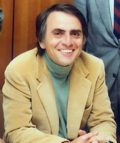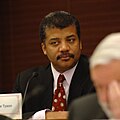Popular science
| You gotta spin it to win it Media |
| Stop the presses! |
| We want pictures of Spider-Man! |
| Extra! Extra! |
Popular science, often shortened to just pop science, is the result of making science accessible to the wider public (or at least accessible to people with non-expert knowledge). There are many books, films, and short television documentaries that fall under this category. It most certainly should not be confused with pseudoscience.
Good v. bad[edit]
Obviously, pop science requires that a lot of the complexity of scientific theories and understanding must be removed for a lay or non-expert audience to understand it. It takes months of lectures, revision, and exercises for a dedicated science student to get to grips with the intricacies of their fields, and years for the consequences of the theories they study to become second nature. With popular science, the aim is to cut out what isn't necessary to understand a theory or to convey it in a way that leads to understanding far more quickly.
Mathematics is often one of these barriers that has to be removed in popular science; in A Brief History of Time,[1] for example, Stephen Hawking remarks how he was told that every equation that he included in the book would halve its sales,[note 1] and thus, he kept only a brief mention of E=mc2 in the introduction. On the other hand, mathematics can sometimes be simplified, or introduced slowly, as is the case in Why Does E=mc2,[2] where the maths are explained with almost patronising simplicity (although they repeatedly apologise for it). This simplification or cutting of finer details invariably leads to mixed results. Popular science can be the source of many misconceptions about scientific theories when done badly — often a theory can be misrepresented by a pop science writer wanting to over-emphasize the sensational aspects of it — but it can cement ideas and perceptions in the public mind when done well.
Magazines[edit]
Much of the public experience with popular science comes through magazines, which range from the generally good (Discover[3] until recently), to the unreadable (Scientific American[4]), to those with an unfortunate tendency to run far too many sensationalistic articles on pseudoscience (most of the rest).
Omni magazine[5] (part of the Bob Guccione/Penthouse stable of publications, published 1978-1995) was one of the worst in this regard, and Science Digest (defunct as of 1988) wasn't much better. Both were fond of trying to pass off silly material on UFOs, ESP, shamanism, and other such subjects as "science". Another popular magazine, appropriately enough titled Popular Science, tends more toward coverage of cutting-edge consumer products and of hobbyist projects than of pure science. Scientific American is more of a pure science magazine, but many find it unreadable and others find it too eager to push an agenda, as in its extended spat with Bjorn Lomborg, author of The Skeptical Environmentalist.[6] Discover attempted to bridge the gap between Scientific American and Popular Science by combining the latter's readability with the former's coverage of pure science, but it has since gone through several changes of ownership (one owner was former Omni publisher Bob Guccione, since ousted), and in recent years has drifted away from skepticism and too much into speculative science woo.
The high prestige of the major pop-science magazines has led to them being confused with peer-reviewed journals. Therefore people often accept the contents of National Geographic or of New Scientist as mainstream canonical. This happens especially in anti-science circles, which can give undue prominence to mistakes made in popular magazines as if they were serious mistakes in high-class journals. The evidence surrounding Piltdown Man, for example, never appeared in peer-reviewed literature but only in the general press,[7] despite appropriate journals existing from the 1920s onwards. Although pop-science magazines or newspapers often do report what has been published and accepted in the proper literature, they also mix this with other forms of journalism, so people should always bear this in mind and take each story for what it is: a news report, a lay summary of a paper, an interview and so on.
Television[edit]
Television is another outlet for popular science, perhaps best typified by the 1980 Cosmos TV series and the accompanying book by Carl Sagan.[8] Cosmos has been one of the most enduring and influential introductions to popular science for tremendous amounts of people, which is probably a good thing because the science behind it is sound and well presented.
Similarly the PBS Nova series and the BBC Horizon program have a similar reputation for good quality. The Horizon episodes 'The Big Bang Machine' and 'What Time Is It?' are notable for launching the television career of the "rock star physicist" Brian Cox, and are good introductions to relativity and the Large Hadron Collider. However, Horizon in recent years has sometimes been criticized for concentrating too much on the drama and personalities and not making best use of the time available: 3-minute breathless intros; repeating itself every 10 minutes; long shots devoid of scientific content (deserts, forests, lakes, busy pavements, crowded freeways, scientist driving his car); shots of talking heads rather than what the heads are talking about. For instance, the content of the 'Mission to Mars' episode of Horizon can be summed up in a (admittedly very good) single 2 minute clip[9] - but the remainder of the episode didn't really add much other than repeating this again. And again. And again. And a few more times just to make it clear.
The Sky at Night is an ongoing monthly television programme on astronomy produced by the BBC. The show had the same permanent presenter, Sir Patrick Moore, from its first airing on 24 April 1957 until his death on 9 December 2012, making it the longest-running programme with the same presenter in television history.
This high degree of quality is not the case with far too many other television "science" series; the 1976-1982 series In Search of... having been a notorious promoter of cryptozoology, pyramid woo, and worse (that it was narrated by Leonard Nimoy served to give it some credibility among Star Trek fans at least).[10]
Popular science, mostly of the good kind, is the main theme of cable/subscription television channels like the Science Channel and National Geographic's various channels. Although good quality, they tend to play to viewer tastes by emphasizing shows involving adventure and danger in topics ranging from crab fishing to storm chasing. The Discovery Channel originally aired many good documentaries and educational pop science programs, but since 2000 its programming has devolved into crappy reality shows based on pseudoscience, pseudoskepticism, and other woo.
Modern players[edit]
Carl Sagan is the single most iconic "popular science" advocate. He made a generation of kids want to grow up and become scientists, and he made a generation of adults awe in wonder at the sky above.
The BBC hosts[edit]
The BBC has a long history of quality television about science, including the less "accessible" Open University, but also Attenborough's Life series from the '70s. Their current approach is to highlight experts in their fields, using different experts for shows on different topics.
- Marcus du Sautoy - Oxford Mathematician highlighting Math in Story of Maths, Beauty of Diagrams, To Infinity and Beyond and The Code.
- Brian Cox - Particle physicist popularizing and explaining the LHC, and physics principles Do you know what Time it is (physics), What on earth is wrong with Gravity, and popular astrophysics Wonders of the Universe and Wonders of the Solar System
- Professor Alice Roberts - Anthropologist highlighting shows on human evolution and the human body, The Incredible Human Body and Are We Still Evolving
- Iain Stewart - shows about geology and the development of planet Earth.
- Jim al-Khalili - Physics and the history of science.
- David Attenborough - Naturalist, host of many documentaries from the 1950s onwards, most notably the Life series.
- Professor Hannah Fry - Mathematician, host of Unvaccinated (2022).
Nova and Discovery[edit]
- Neil deGrasse Tyson - Astrophysicist - hosting a youth-focused look at the world of science, NOVA Science Now. Plus he's created a very cool-looking Cosmos reboot.
- Michio Kaku - Particle physicist hosting specials on "science fiction and reality"; Sci-Fi, The Science of the Impossible.
CBC Television[edit]
- David Suzuki - Zoologist, host of the generic science show, The Nature of Things.
See also[edit]
Notes[edit]
- ↑ Though this is obviously not literally true, as it would have led to many bestsellers having sold a quarter of a copy.
References[edit]
- ↑ See the Wikipedia article on A Brief History of Time.
- ↑ The New Scientist Review
- ↑ Discover Magazine
- ↑ Scientific American
- ↑ Omni Magazine Online ("tribute site")
- ↑ Scientific American - Misleading Math about the Earth
- ↑ Times Online Archive - First evidence of a new human type (1912)
- ↑ Cosmos - just watch it.
- ↑ How Will the Curiosity Rover Land? - Horizon: Mission to Mars - BBC Two
- ↑ In Search Of... Atlantis (face meet palm, palm meet face, you're going to get on well)







